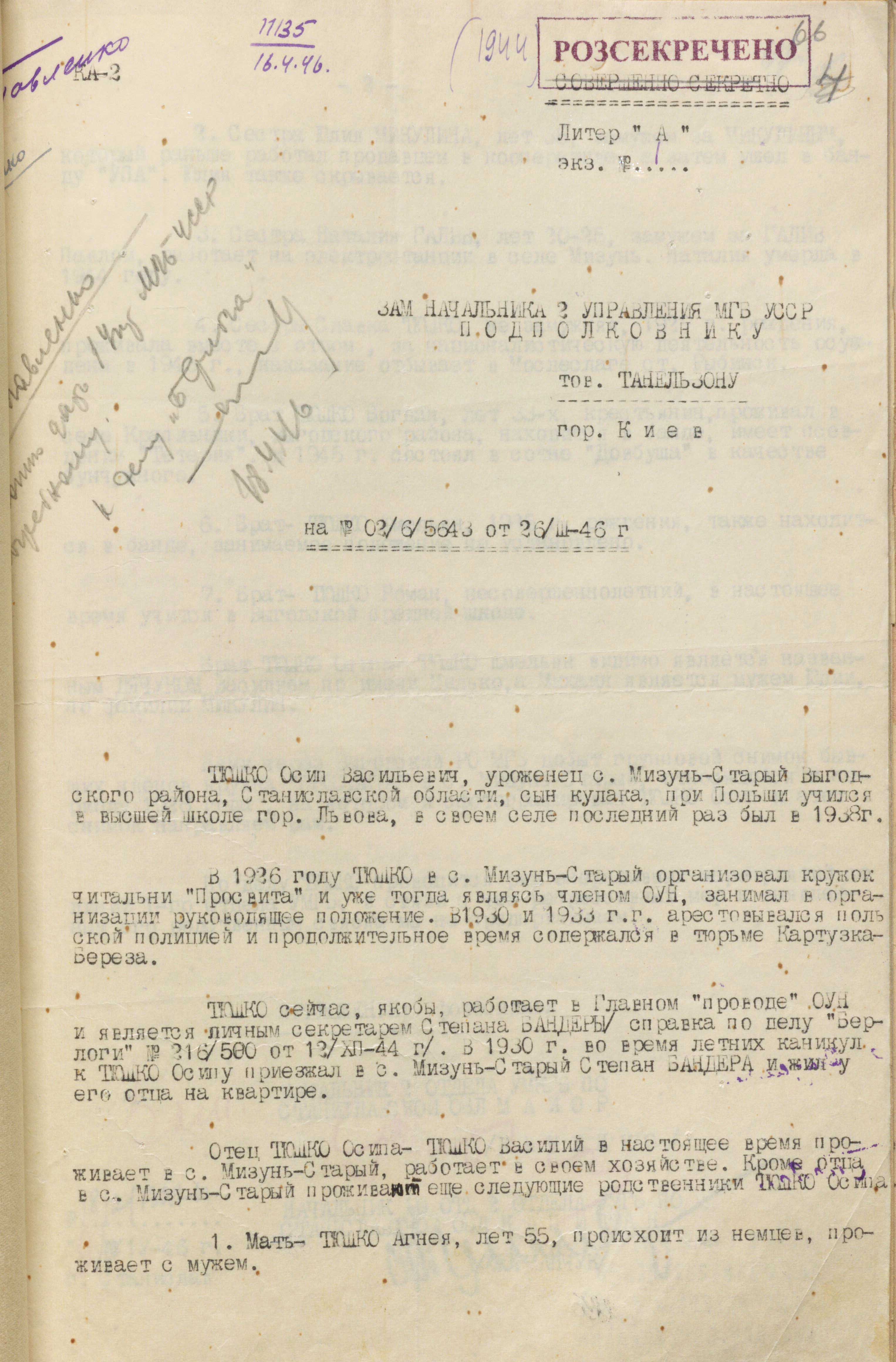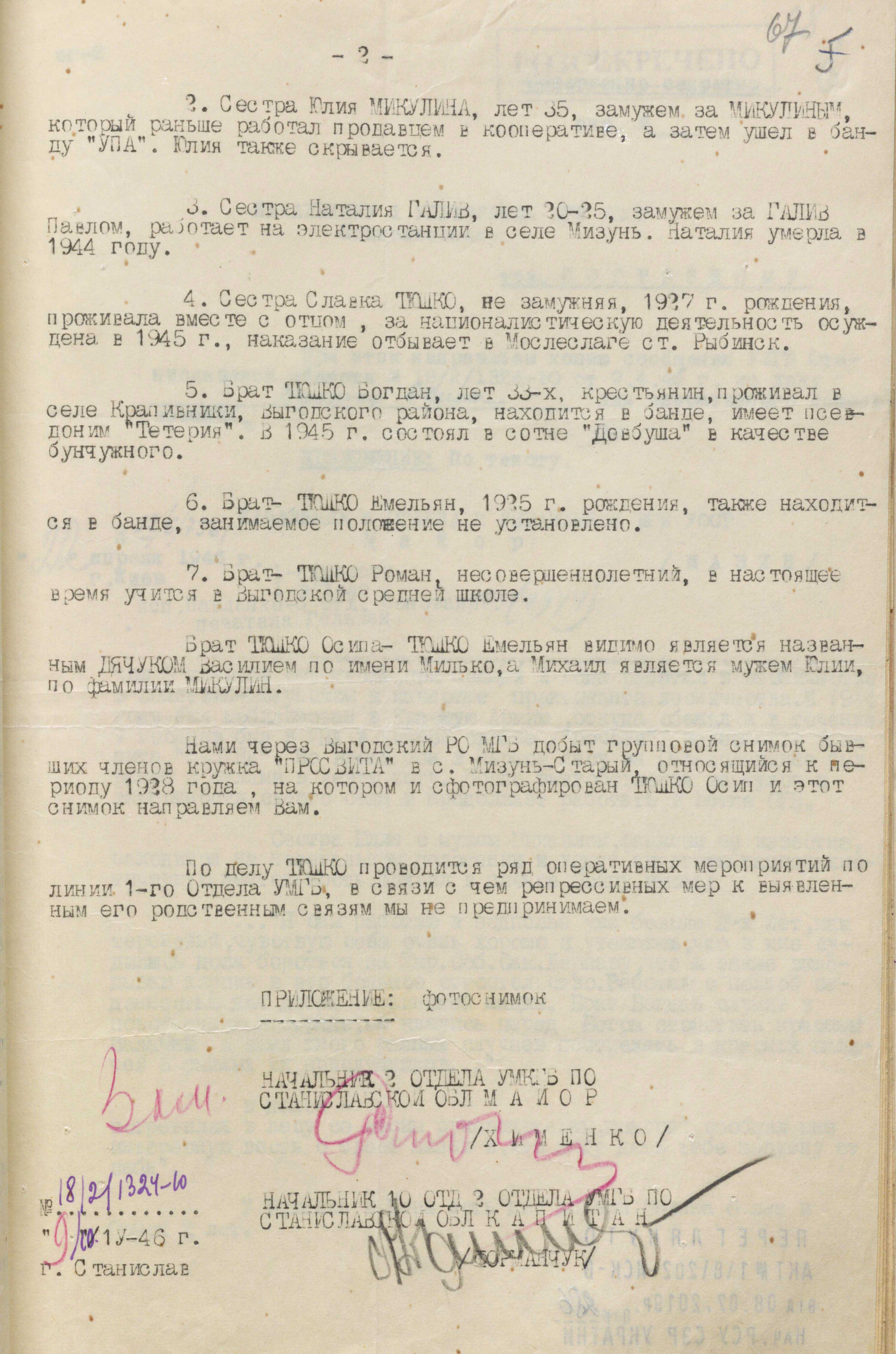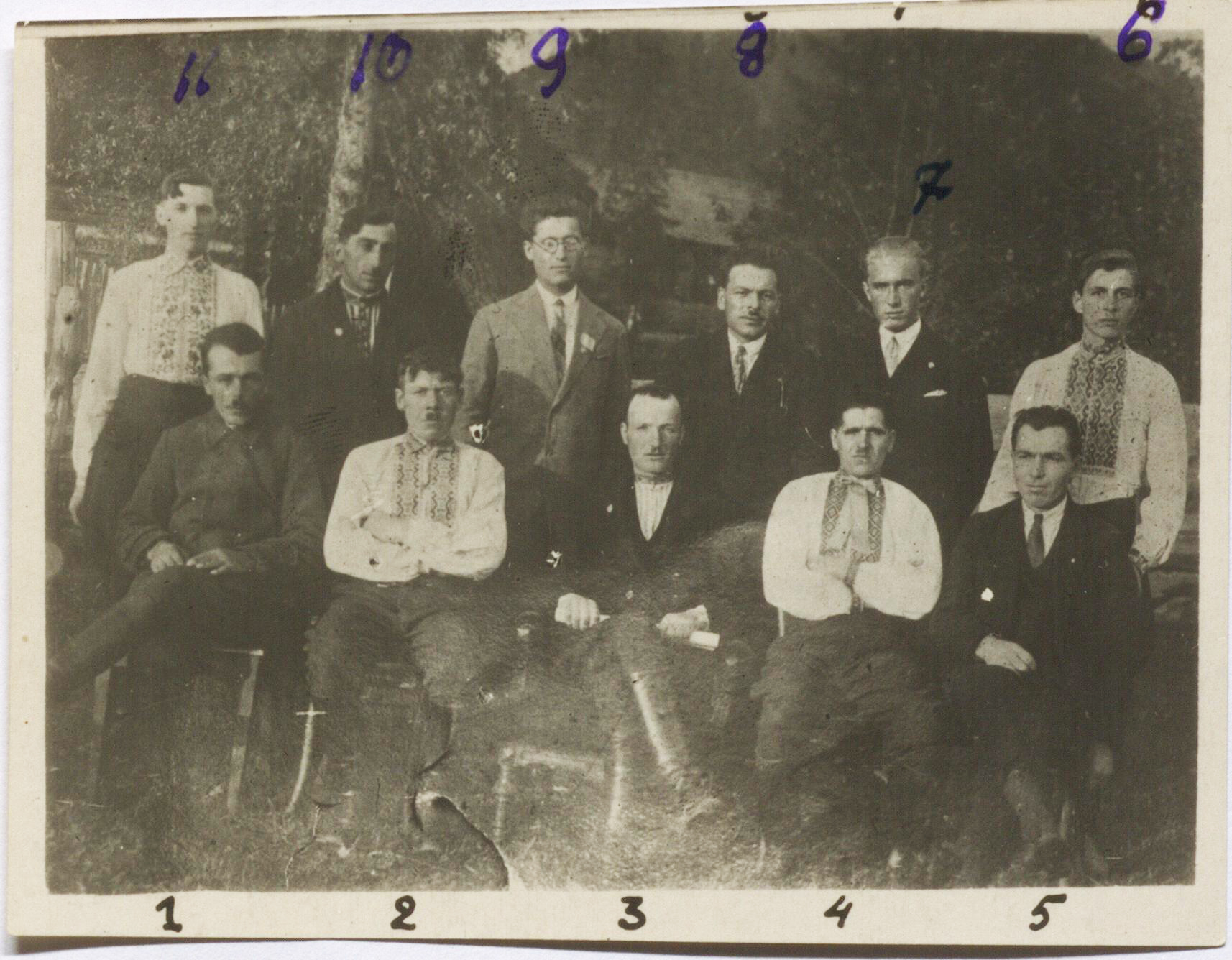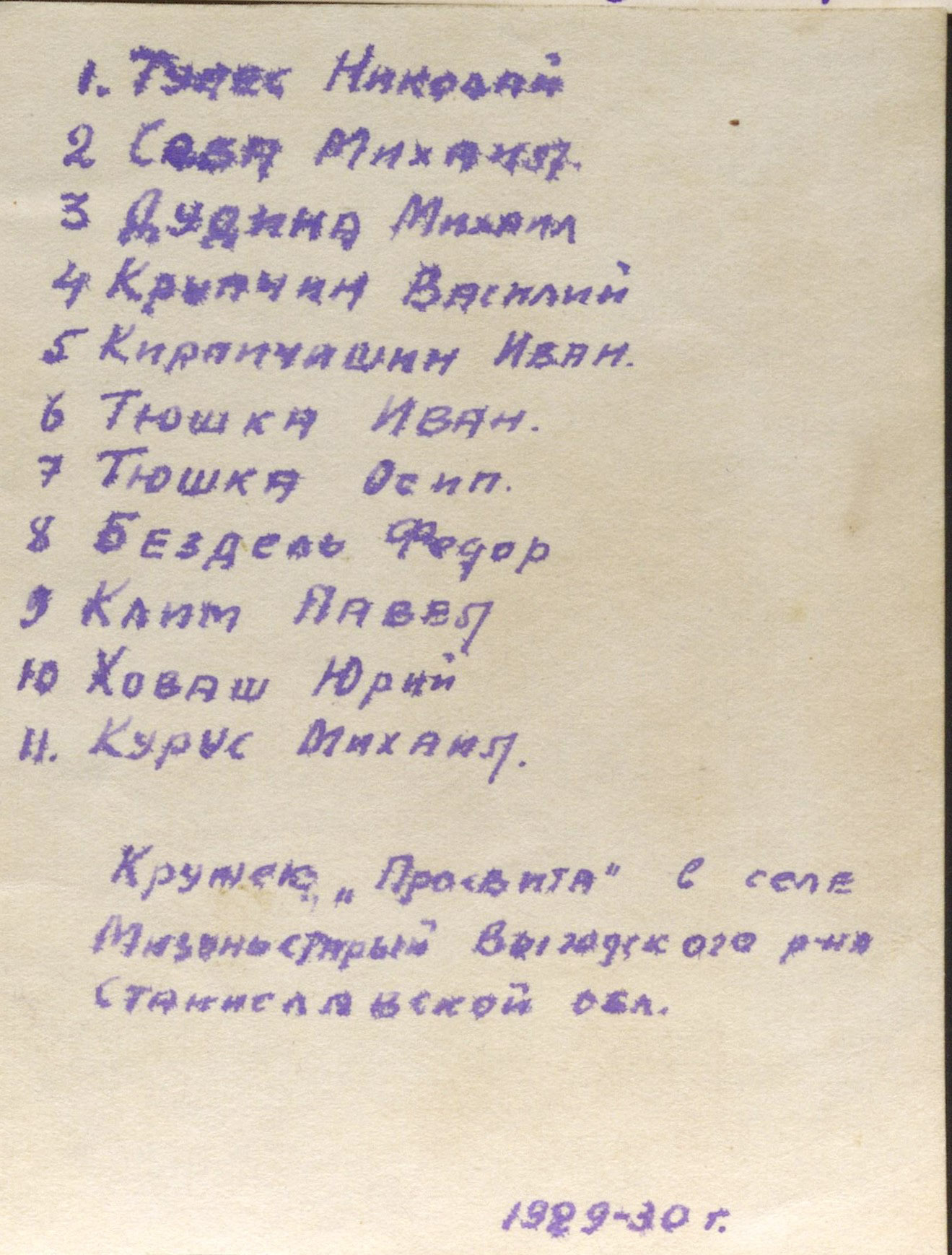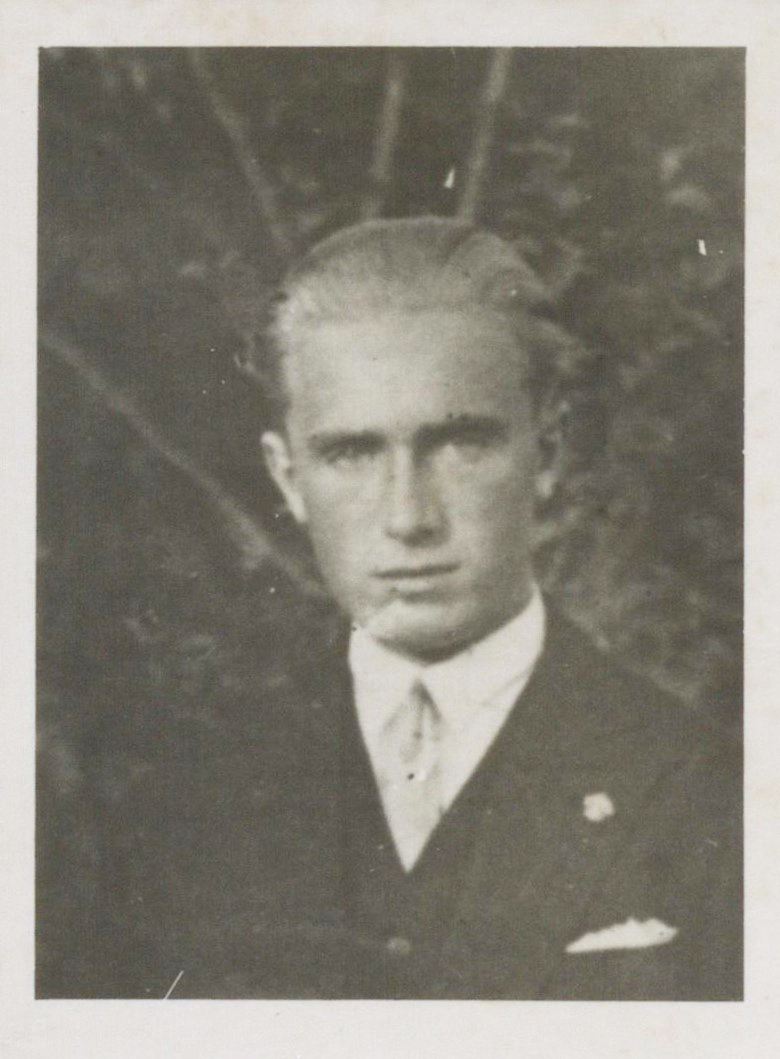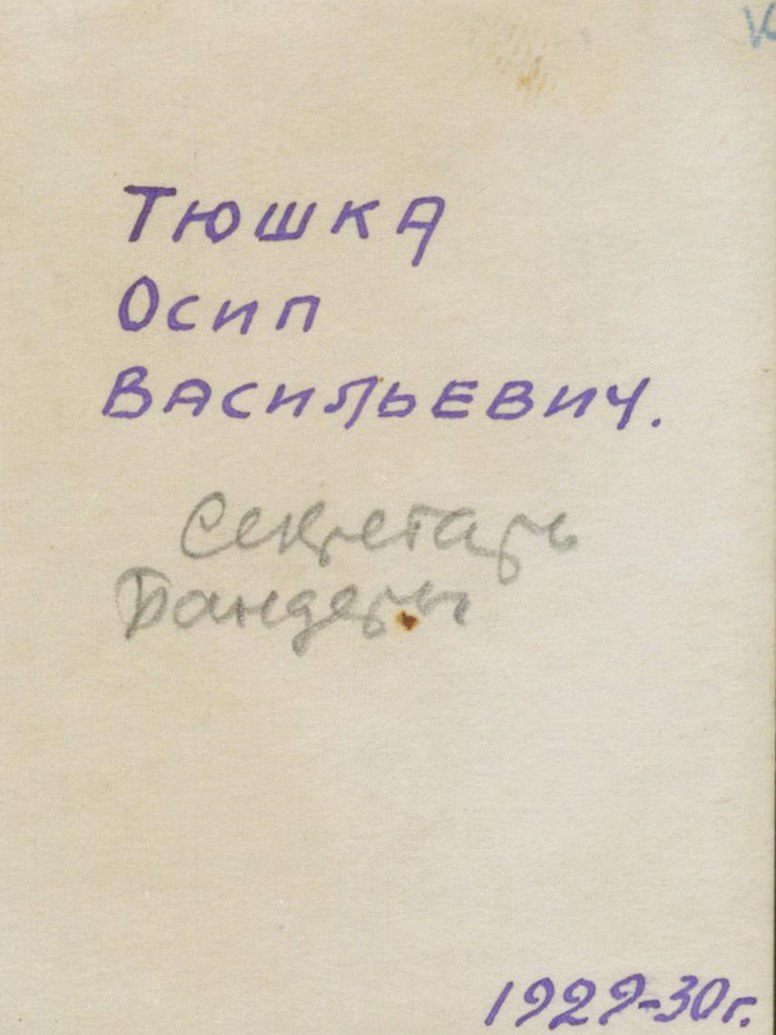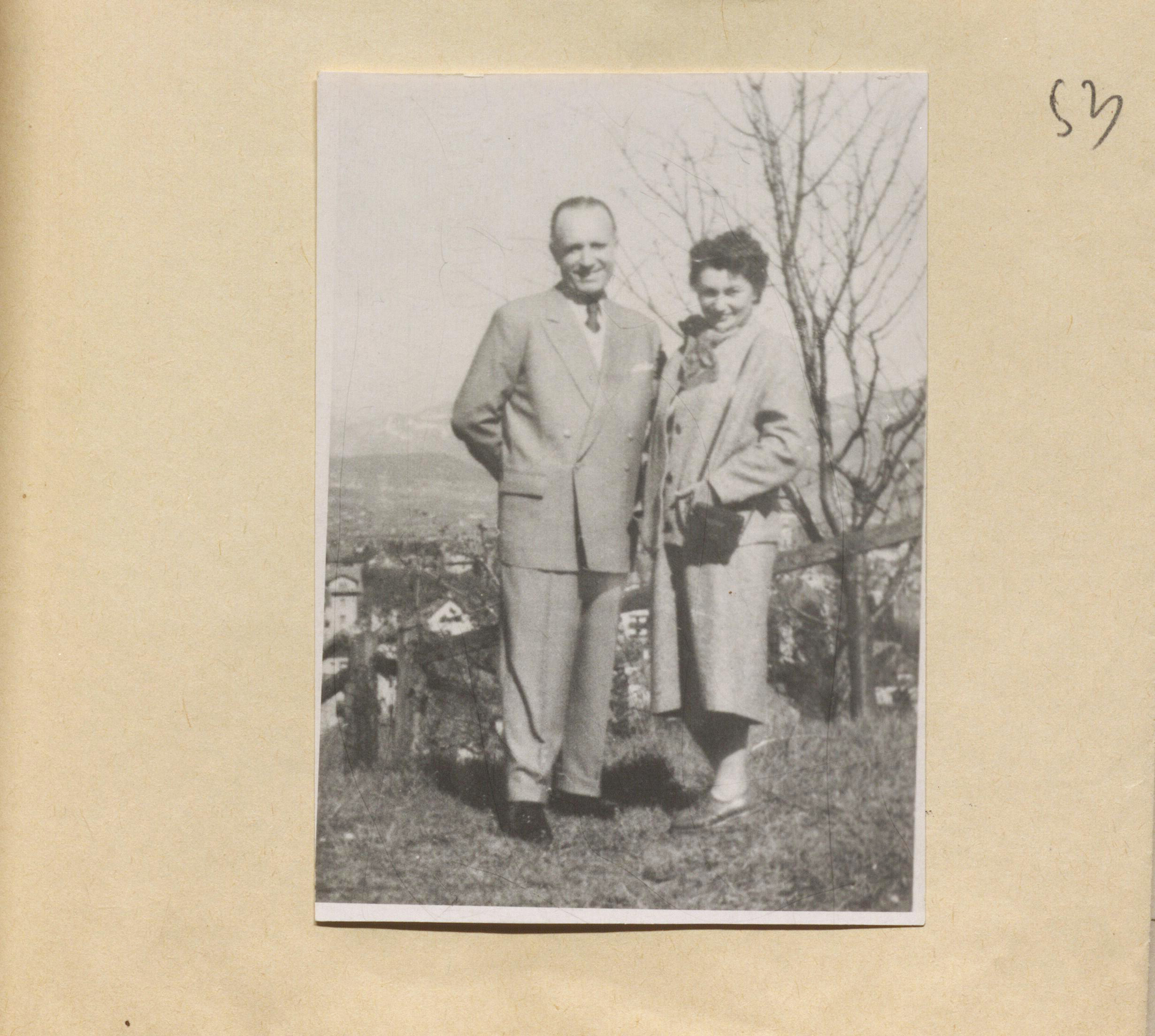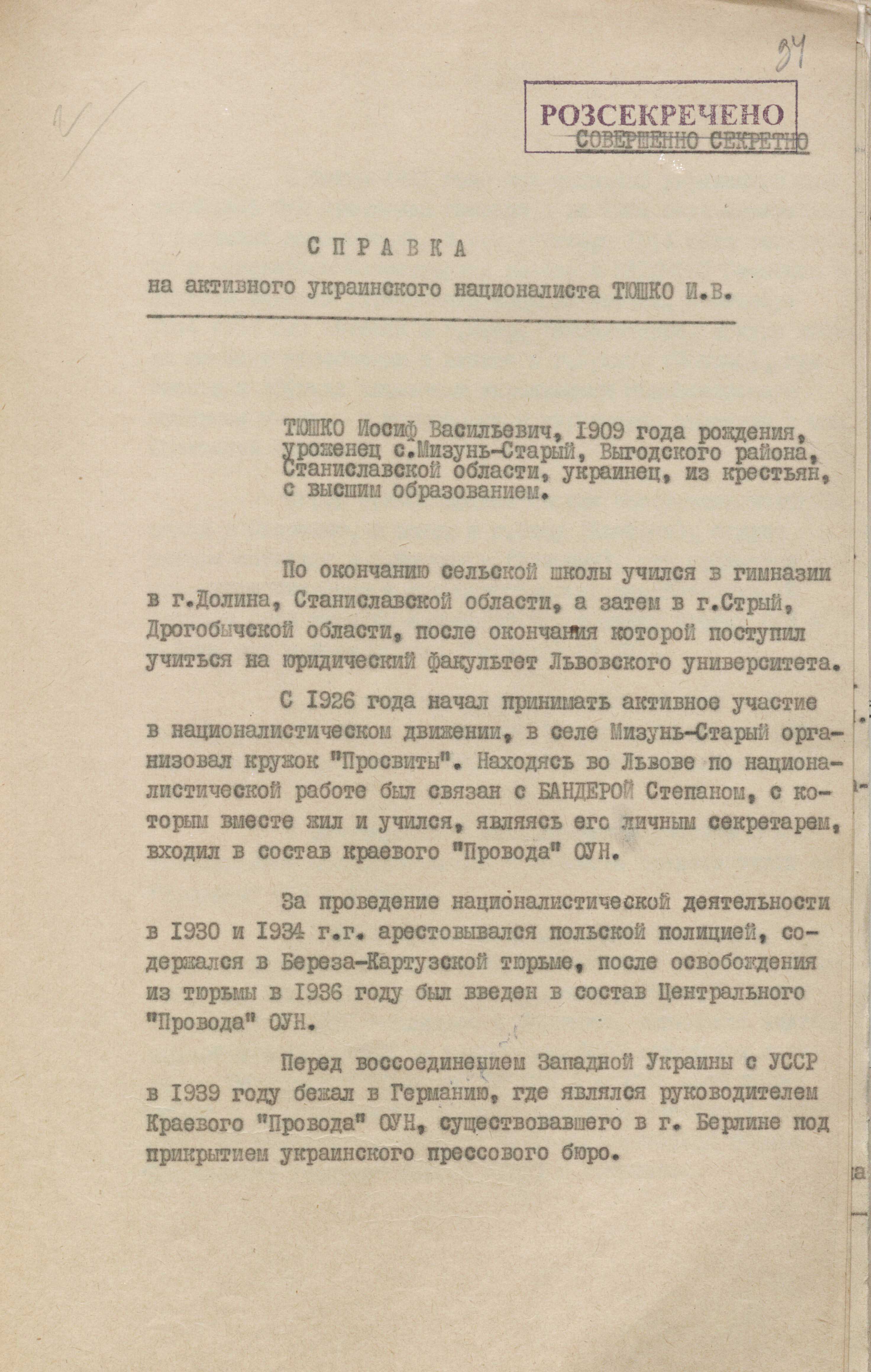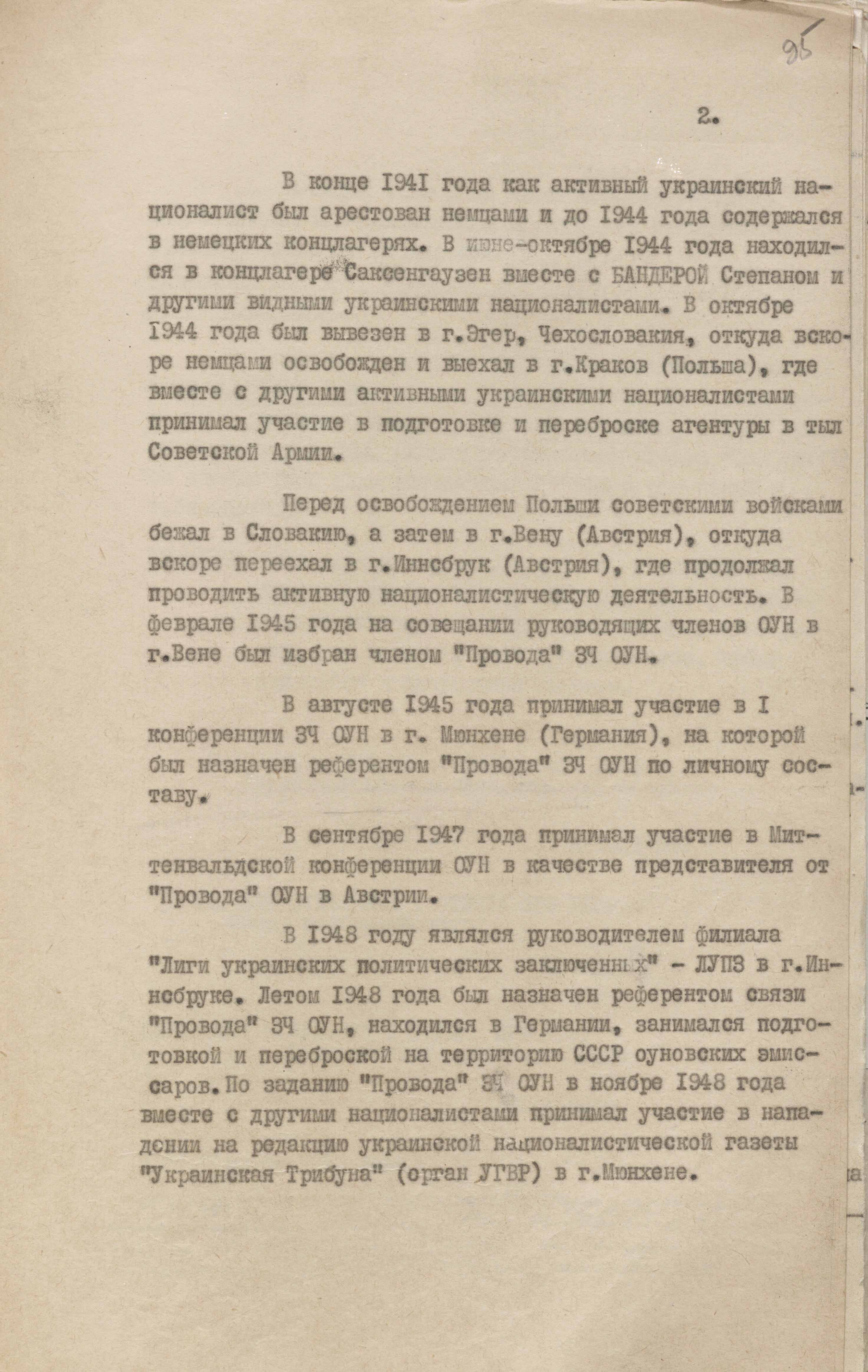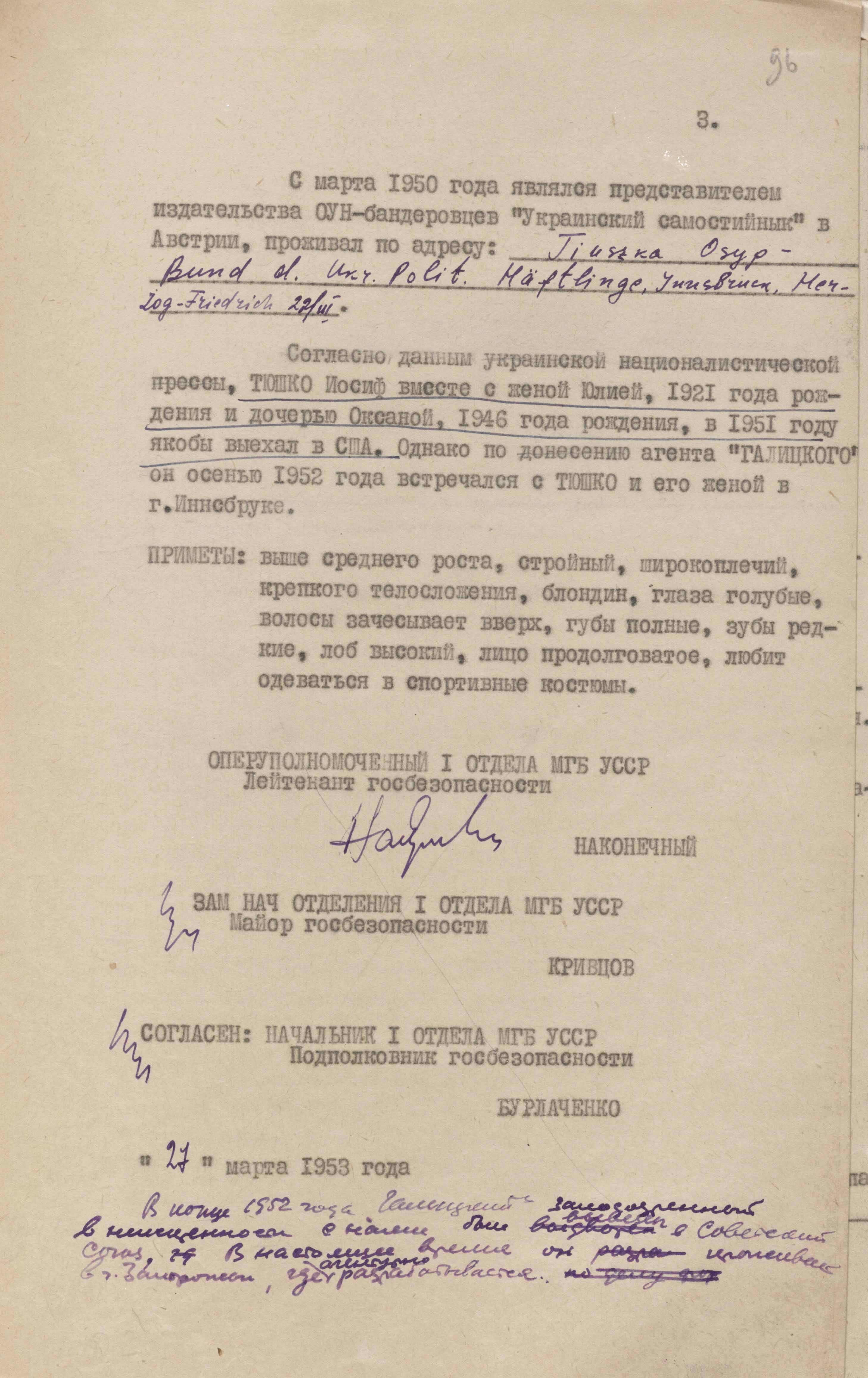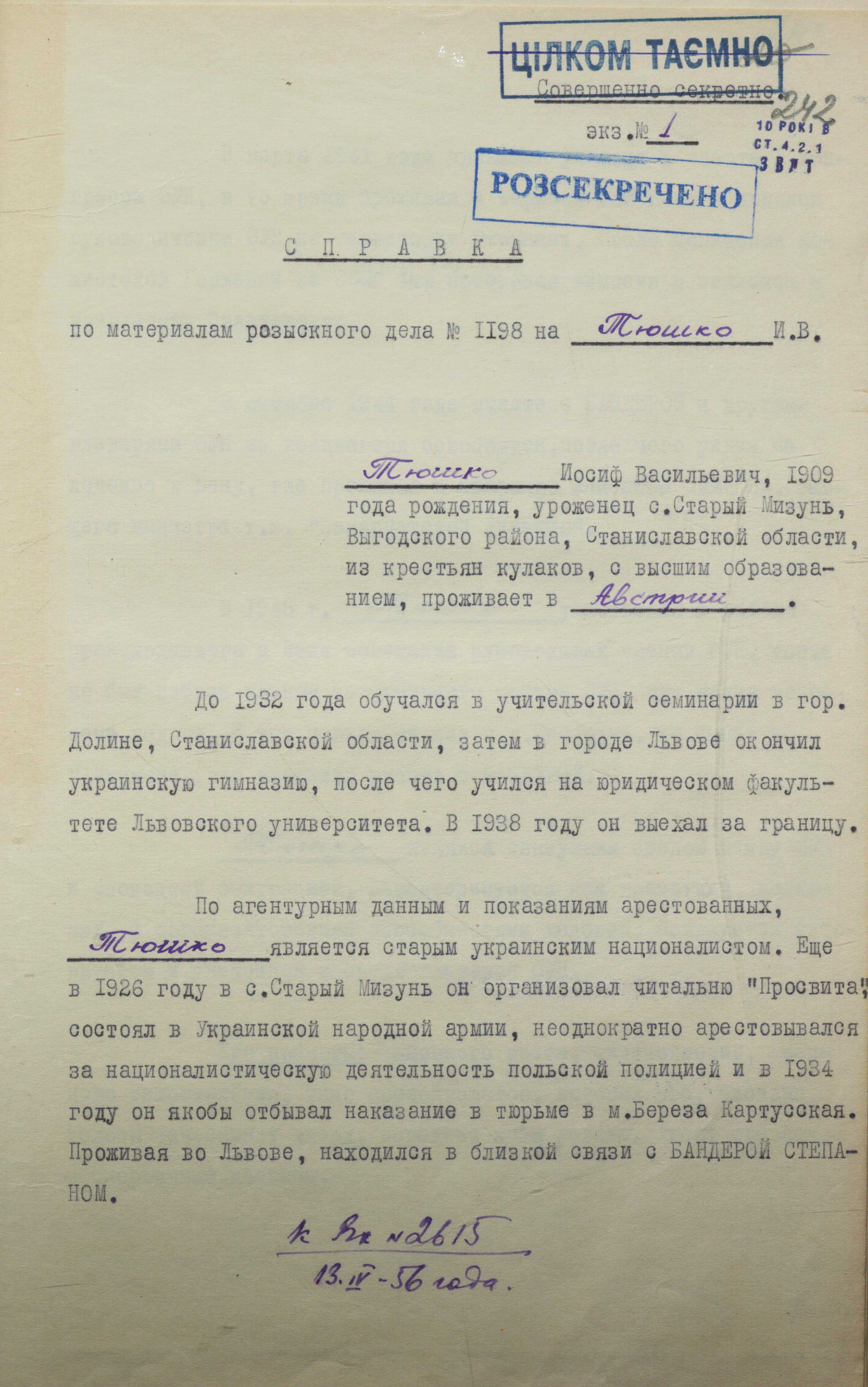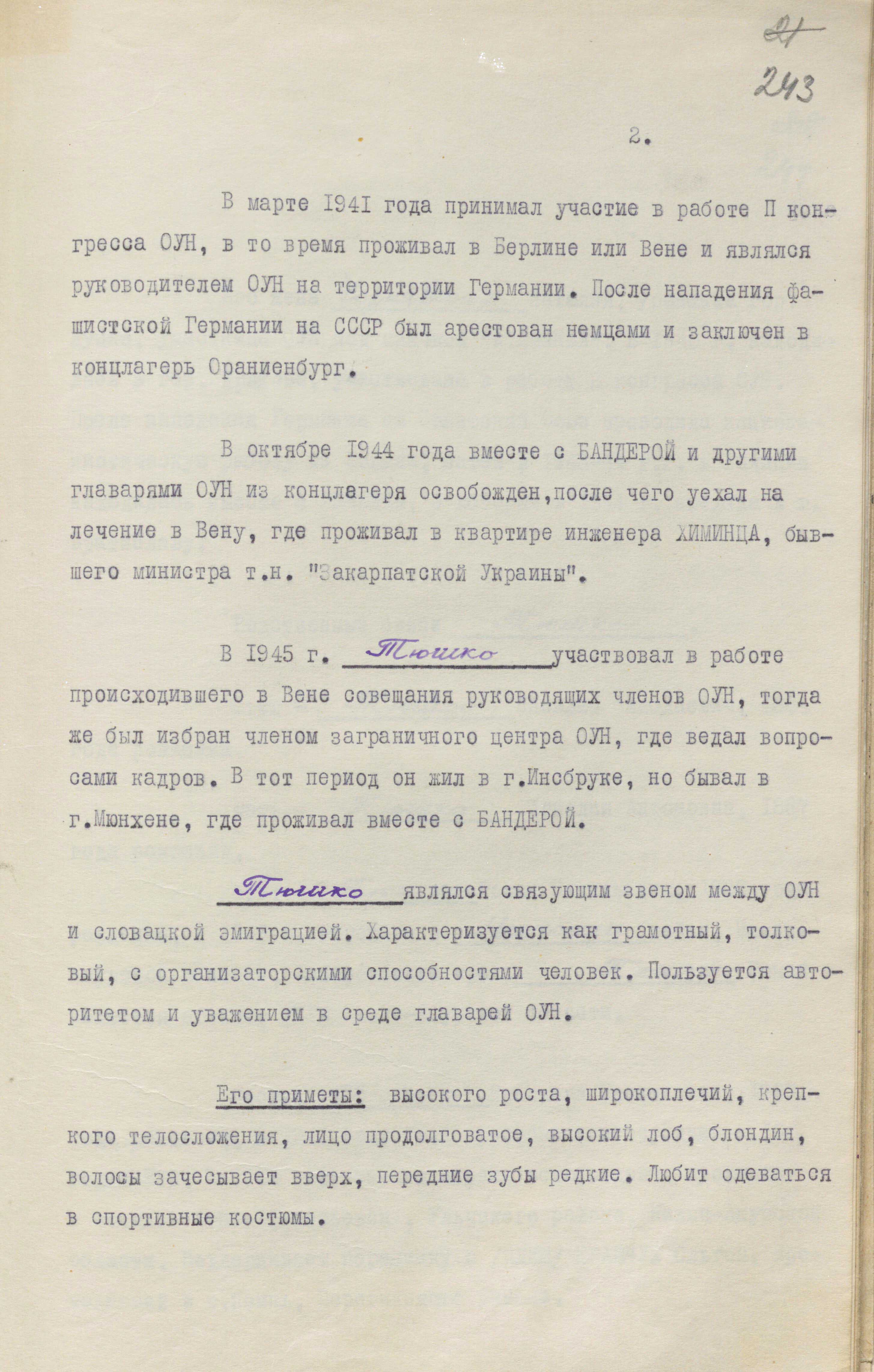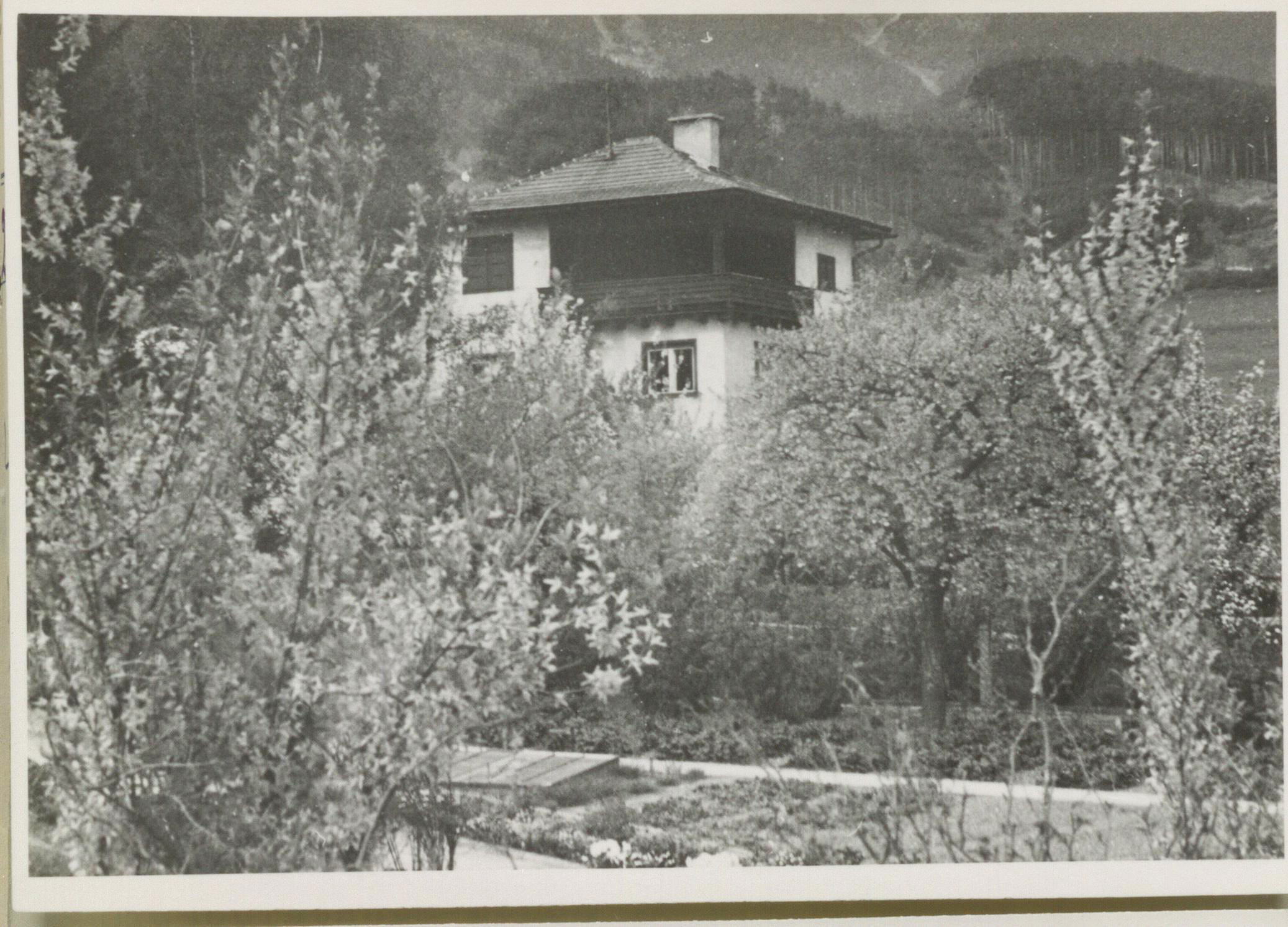Osyp Tiushka. 40 Years With Stepan Bandera
10/15/2024
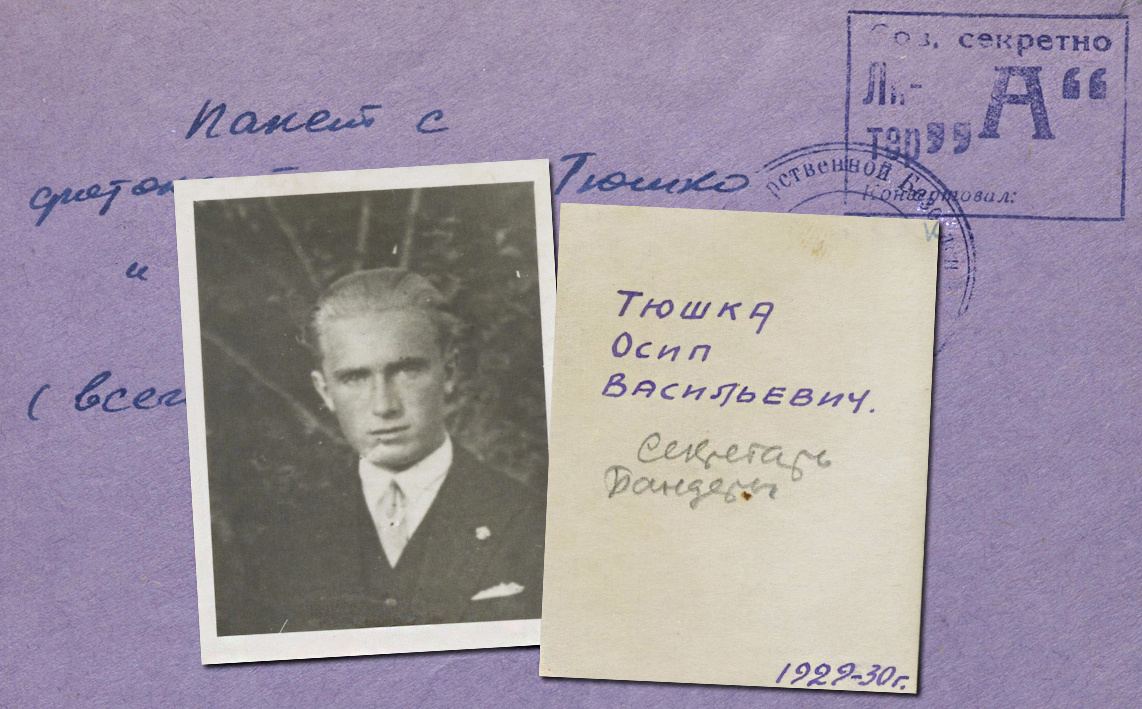
He was one of Stepan Bandera's closest friends. They became friends while studying at Stryi Gymnasium. Together, they were members of the leadership of Plast and the OUN, shared similar ideological beliefs and views on the national liberation movement, were imprisoned in Hitler's Sachsenhausen concentration camp at the same time, jointly developed the structure of the OUN Revolutionary after World War II, and were subjects to the kgb operational cultivations. But the role and place in those kgb plans and activities were different for each of them. Declassified documents from the archives of the Foreign Intelligence Service of Ukraine tell us about this.
A Courier’s Letter Intercepted
In February 1946, in Poland, the sssr mgb officers detained OUN courier Vasyl Dyachuk who was trying to get to the American zone of occupation in Germany. During the search, they found, among other documents, letters from relatives to Osyp Tiushka, known to the Chekists as a close friend of Stepan Bandera. This event was given great importance. The report on the detention was placed on the desk of Pavel Fitin, the head of the soviet foreign intelligence service in moscow. He immediately instructed the chief of the mgb of the Ukrainian ssr Serhii Savchenko to collect all information about O. Tiushka's relatives and began their operational cultivation.
On February 21, 1946, a resolution was signed to open a case file on O. Tiushka. It already contained primary information about him: he was born in the village of Staryi Mizun, Vyhoda district, Stanislav region (now Dolyna district, Ivano-Frankivsk region); for his OUN activities in 1930 and 1933 he was arrested by the Polish authorities and held in Bereza-Kartuzka prison; he was Stepan Bandera’s close friend and his secretary in the OUN Central Provid abroad. The case was code- named “Sluha”(“Servant”- Transl.)
Soon, the Stanislav region department of the mgb of the Ukrainian ssr gathered more detailed information. The paper stated that in 1926 O. Tiushka organized a “Prosvita” reading group in the village of Staryi Mizun and, as a member of the OUN, held a leadership position in the local organization. In 1930, Stepan Bandera visited him in the village, and they spent their summer vacations there together. As for his close relatives, his parents lived in the same village, his sister Natalia died in 1944, sister Slavka was convicted of nationalist activities in 1945, his third sister Yulia was in hiding because her husband was in the UPA, his brothers Bohdan and Omelian were also in the UPA, and the youngest Roman was studying at school.
Through agents, the chekists managed to obtain a photograph of O. Tiushka. It was a group photo of members of the local “Prosvita”, taken circa 1929-1930. Osyp is marked with the number 7. From other sources, they learnt that he studied at the Law Faculty of Lviv University and was in charge of the underground magazine “Surma”. Before the outbreak of World War II, he moved to Berlin and lived there with S. Bandera in the Ukrainian House. Soon he took up the post of territorial leader of the OUN in Germany and, together with other figures, participated in the preparation and dispatch of combat groups to the eastern lands of Ukraine. After the war, along with Mykola Lebed, Myroslav Prokop, Yaroslav Stetsko, Lev and Daria Rebet, Ivan Hryniokh, and others, he became a member of the OUN Foreign Bureau, which was led by Stepan Bandera. The list of members of the Bureau, compiled by the mgb of the Ukrainian ssr, includes the following information about him: “Personnel Officer, former personal secretary of Bandera, one of his confidants”.
By that time, the chekists had already taken each of the Bureau's members into operational cultivation. At this, O.Tiushka, was paid the greatest attention. All because of his being close to S. Bandera. They wanted to have a person in the OUN leader’s inner circle who would report on all his plans and ideas and, come the need, could fulfill the mgb’s other tasks. Therefore, the documents on the operational cultivation of O. Tiushka included a paragraph on studying the issue of his recruitment. But first, they had to find an approach to one of his close relatives.
“The Suspension of Repressions Against Tiushka's Relatives Is Canceled”
As soon as the idea of recruiting O. Tiushka was ripe, the local mgb authorities were instructed to suspend any repression against his relatives and to study them. And this – despite the fact that at that time in Western Ukrainian lands, a large number of OUN members, UPA servicemen and their families were subject to deportation to Siberia and the Far East.
But the study did not last long and did not bring the desired results for the chekists. According to archival documents, brothers Bohdan and Omelian were killed during chekist-military operations in the region against UPA units. Sister Yulia was never found. She was hiding at the time. And her husband was killed by the chekists in 1947 in Bolekhiv district.
By threats and intimidation, mgb officers managed to persuade several villagers who had previously been in the UPA ranks to cooperate. They hoped that they would be able to gain the trust of Tiushka's family members. But they miscalculated. Tiushka’s family did not provide any important information. Moreover, they did not change their anti-soviet views. As a result, they were arrested and sentenced to various terms of imprisonment. Their relatives, who had been temporarily spared, were also repressed.
Therefore, all efforts to recruit any of O. Tiushka's relatives or acquaintances were in vain. “On the basis of information”, one of the documents stated, “which shows that all of Osyp Tiushka's relatives are ardent Ukrainian nationalists, some of whom are in the active OUN underground and UPA gangs, the 2nd directorate of the mgb of the Ukrainian ssr on 27.03.46 instructed the 2nd department of the mgb in Stanislav region to find and arrest the relatives of Osyp Tiushka... Now the expediency of suspending the instruction to repress Tiushka's relatives is gone, so we would consider it necessary to enforce the instruction of the 2nd directorate of the mgb of the Ukrainian ssr on the repression of O. Tiushka's relatives” (BSA of the SZR of Ukraine. - F.1 Case 12609. - V.1. -P.73).
As a result, O. Tiushka’s parents and brother Roman, who had just finished the tenth grade, were exiled, as noted in archival documents, to “remote regions of the ussr to a special settlement”. In particular, to one of the gold mines in Ulchinsky district of Nizhneamursk region of the Khabarovsk Territory.
An “Accidental” Fellow Traveler in a Railway Carriage
Meanwhile, new information about Osyp Tiushka was coming from foreign agents. The latter reported that he, his wife Natalia, and daughter Oksana had settled in Innsbruck, where he rented a house on the outskirts of the city, became a territorial leader of the OUN in Austria, and created a whole network of the Organization of Ukrainian emigrants there. At the same time, he was a leading member of the Ukrainian Liberation Front. In 1950, he became the head of the League of Ukrainian Political Prisoners in Austria.
One of the reports stated that S. Bandera resided with him at the end of the German-soviet war and in the first months after the war, and that they met regularly to discuss the continuation of the liberation struggle. Whenever he came to Munich, he would certainly stay at S. Bandera’s.
It was at that time that the kgb under the council of ministers of the ussr began to actively develop and implement measures to liquidate S. Bandera. They used every chance to collect as much information as possible about his whereabouts, trips outside Munich, meetings, and close associates. Osyp Tiushka, as his old friend, could have been the link that would have completed the incomplete picture. In particular, if S. Bandera had once again come to visit him, it would have been easier to commit the murder on the outskirts of Innsbruck, away from other houses and crowded places.
All of this forced to look for new approaches to O. Tiushka and the possibility of examining the area around his house. At that time, the chekists found out that in 1959 the term of stay in the special settlement of Osyp's parents and brother Roman was coming to an end and that they intended to return to their native land in Ukraine. So they decided to take advantage of this. Having analyzed a number of operational cases, they found a dossier on “Krylatyi” agent from Lviv who also had close relatives in the special settlement in Chita region. The agent was urgently summoned to a meeting and given the following task:
“On June 24 of this year, you are to go to Irkutsk, where you will be put in a carriage of the train No. 43 “Vladivostok-moscow”, in which the family of one of the leaders of the OUN Foreign Units, Osyp Tiushka, will be travelling to Ukraine from the special settlement in chita region.
On the way from Irkutsk to Lviv, you have to get acquainted with Osyp Tiushka's brother, Roman Tiushka, his wife and parents, attract their attention and create conditions for consolidating your acquaintance and meetings with members of this family in Ukraine in the future.
Your traveling in the same carriage with the above-mentioned persons will be provided by our capabilities, and therefore, getting acquainted with them as fellow travelers will not be difficult”.
(BSA of the SZR of Ukraine. - F.1. - Case 12609. – V. 2. - P.144).
Tiushka’s family were sharing the compartment of the train to Irkutsk with an officer of the external surveillance department of the kgb for Chita region. And then his seat was “accidentally” taken by agent “Krylatyi”. The conversation about relatives who had suffered from the soviets and were exiled made it possible to establish contacts for the future, which was what the chekists wanted. In this way, they wanted to soon send the agent, tested in a number of cases, to Austria and there also arrange an “accidental” meeting with Osyp Tiushka and intensify the operational cultivation of the latter. But everything was limited to an exchange of letters. According to archival documents, this plan was not developed further.
“Recruit During the World Youth Festival”
After an unsuccessful attempt to bring agent “Krylatyi” to Austria, the kgb under the council of ministers of the Ukrainian ssr decided to put an authorized operative in contact with O. Tiushka. Shortly before Osyp’s relatives returned home, the officer was sent from Kyiv to the place of their special settlement in Ulch district of Nizhny Amur region of the Khabarovsk Territory under the guise of a correspondent for the newspaper “Soviet Ukraine”. During that “editorial” business trip, he met O. Tiushka's relatives, among others, and took their address. Then, upon his return to Kyiv, he sent them photographs taken by him, wrote letters, and tried to secure the established contacts with certain promises to help with housing and solving various issues.
Thus, having secured this acquaintance with letters, and photographs, the kgb officer was to go to Vienna to the 7th World Festival of Youth and Students and look for O. Tiushka there. This time – under the guise of a correspondent for the magazine “Physical Culture and Sports”. The plan of operational measures stated that he should take the position of a soviet patriot and convince O. Tiushka to give up nationalist activities, telling him about the return of his relatives from exile, their allegedly positive perception of soviet reality, and their recommendations.
Less than three months remained to S. Bandera's assassination. Any information about him at that time was of special interest to the kgb. Therefore, the establishment of contact with O. Tiushka as his close friend was of great importance. One of the papers, dated June 30, 1959, reads: “Tiushka very often travels to Munich to see Bandera, from whom he receives instructions for further work, stays in Munich longer than at home, but does come home every Saturday and Sunday. In the afternoon, he takes a walk with his family around the neighborhood, not far from home... His villa is on a hill, visible from afar. Around the villa there are bushes and some fruit trees, on the side of Grosser Gott there is a small gate in the fence, which is known only to people associated with Tiushka... Tiushka walks alone, without bodyguards, whom he obviously does not have” (BSA of the SZR of Ukraine. - F.1. - Case 12609. - V.2. - P. 161).
According to archival documents, on July 26, 1959, the “correspondent” arrived in Vienna. Together with the staff of the Vienna residentura, the kgb began to look for opportunities to meet with O. Tiushka during festival events. After all, they had information that the Banderites had planned some of their own events. In particular, reports from foreign agents stated that S. Bandera had instructed the chiefs of the OUN Security Service Ivan Kashuba and Stepan Mudryk to collect information about the real state of affairs in the Ukrainian ssr among members of the Ukrainian delegation, as well as to distribute Ukrainian publications among them. Osyp Tiushka, who knew the state of affairs in the Austrian capital city better than anyone, was also involved in these activities. But despite all efforts, kgb officers could not hold such a meeting with him.
A “Kryivka (Hideout) House” with a Rifle at the Entrance
After the assassination of Stepan Bandera on October 15, 1959, and Bohdan Stashynsky’s 1961 confession to committing this act of political terrorism, the kgb of the ussr suspended active measures against leading figures of the Ukrainian emigration. This was facilitated by the condemnation of the kremlin's policy by the entire civilized world. But this did not last long. Especially as moscow was not going to admit guilt.
According to declassified documents, already in the early 1960s, old plans were renewed and new ones were developed to infiltrate kgb agents into foreign centers of Ukrainian emigration, recruit or discredit its leaders, and in some cases assassinate them. As for O. Tiushka, in 1967 a decision was made to recruit him. The same authorized operative was instructed to do this, but not under the guise of a correspondent, but on behalf of the kgb “through a direct offer of cooperation”.
The recruitment plan suggested to tell O. Tiushka that his nationalist activities were futile, promise him a good job if he wanted to return to the ussr and full financial support for him and his family. This was taking into account the merits that were expected of him. The point was that he had to earn his return to his homeland by providing information about the OUN's Foreign Units, plans, and active members of the organization. His participation in the public repentance and debunking of his past nationalist activities was not excluded. The guarantee of this was that there would be no new persecution against his close relatives, who had already suffered and served their sentences.
One of the options was for the operative to visit O. Tiushka's home and conduct such a recruitment conversation with him there. But there were certain concerns that he might behave unpredictably, detain the visitor, or call the police. The agents' reports about the owner's lifestyle and the house itself also led to such thoughts. Some suggested that the villa where O. Tiushka lived was used by the OUN as a hideout house. Yaroslav Stetsko and other activists were spotted there.
The information collected about his wife was not encouraging either. As stated in the reports, his wife Natalia was a member of the OUN and had the pseudonym “Otamansha”, in 1940 she was in Krakow, participated in the Second Congress of the OUN, during World War II she was involved in underground work in Volyn, allegedly worked together with the Chief of the OUN Security Service Mykola Lebed and, together with him and other figures, emigrated to Czechoslovakia and then to Austria, where she met O. Tiushka. After receiving this information, the kgb questioned the advisability of visiting O. Tiushka's family at home.
The information that the owners had weapons and that personal belongings of people who had previously been sent as emissaries on intelligence missions to the Ukrainian ssr were stored in the deep basement added to the doubts. Thus, it was almost a kind of insurgent kryivka. One of the intelligence reports stated that the house rented by O. Tiushka was a kind of an “Austrian burg”, that is, a tower or fortification. In it, for uninvited guests, “The Master of the house has created a frightening kind of weapon in the form of a bent rifle muzzle, without a magazine, which he pushes out through a hole in the front door when a stranger wants to enter”. And the vantage point is allegedly the bedroom window, where the entrance is clearly visible.
All this forced the kgb to change the plans and look for other options. The search lasted for several years. Eventually, in January 1975, a decision was made to terminate the operational cultivation and to file the case in the archives. The reasoning was that O. Tiushka was seriously ill and no longer actively involved in social and political activities. He was really ill. His long-standing diseases from the period of his stay in the concentration camp were evident. Despite this, he remained the head of the Association of Ukrainian Nationalists in Austria to the end of his life. He passed away in Innsbruck on September 2, 1983, and was buried in the local cemetery.
Osyp Tiushka did not become so famous as his close friend Stepan Bandera. At the same time, he never envied that popularity and did not compete for any high positions in the OUN hierarchy; on the contrary, he sought to be less visible in public space. According to archival documents, he would never have done anything to harm S. Bandera or the Ukrainian liberation movement in general, even if that operational contact had taken place and someone had tried to pressure and blackmail him.
